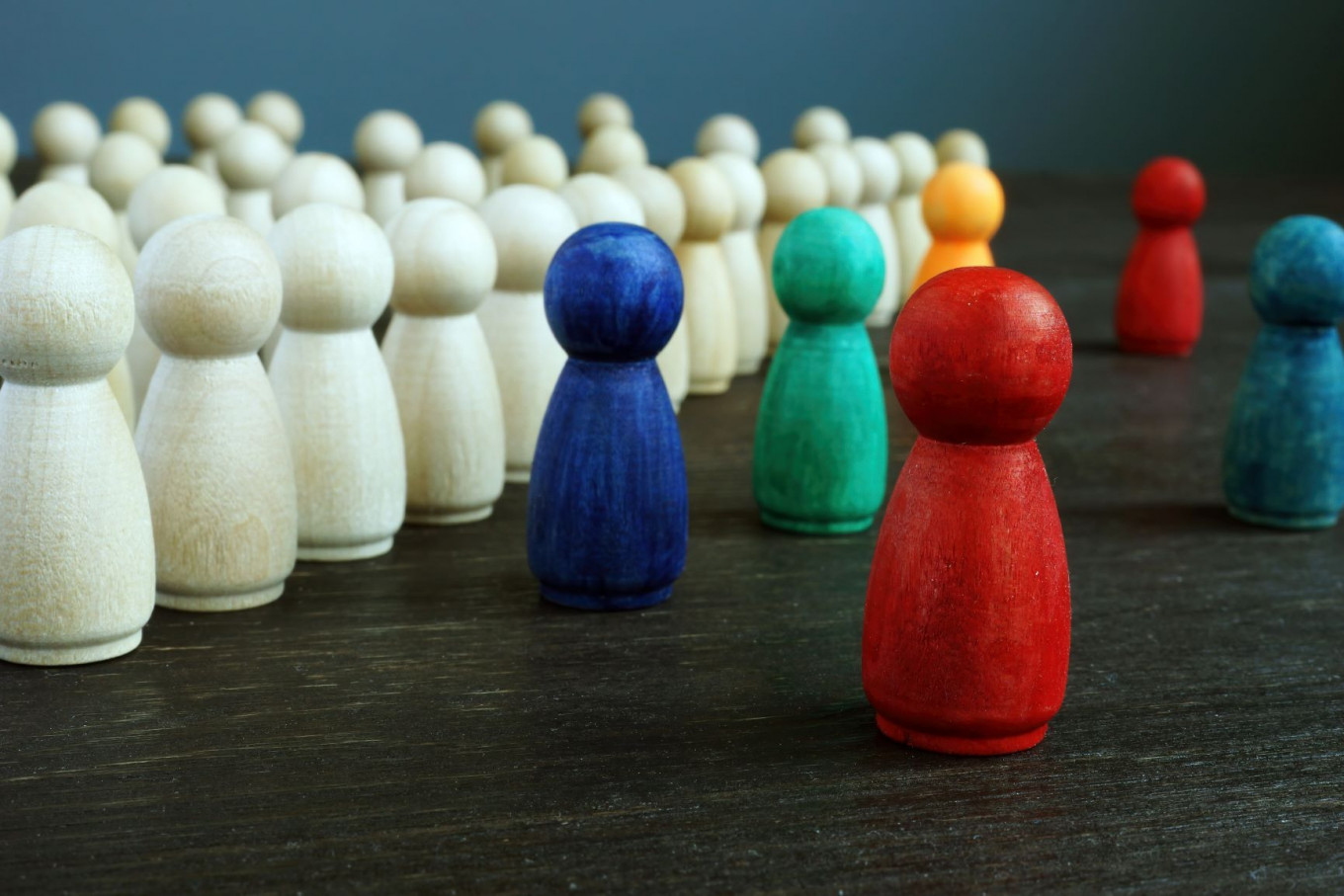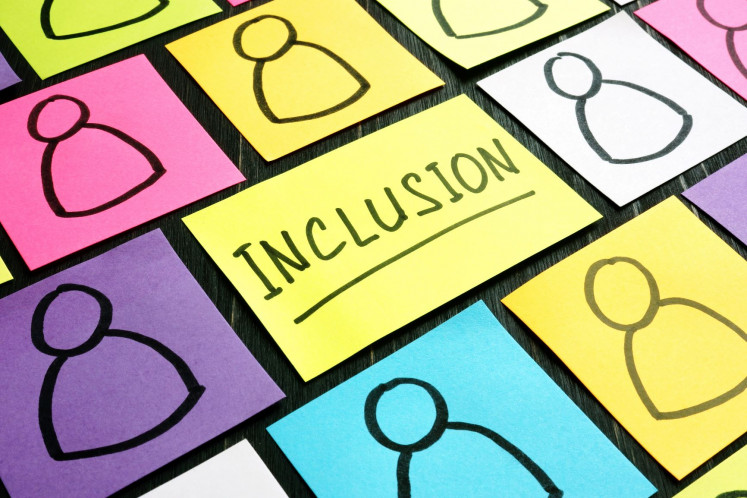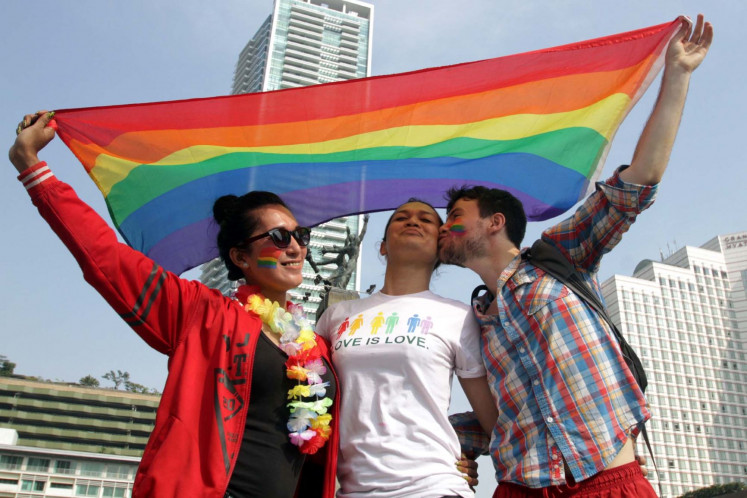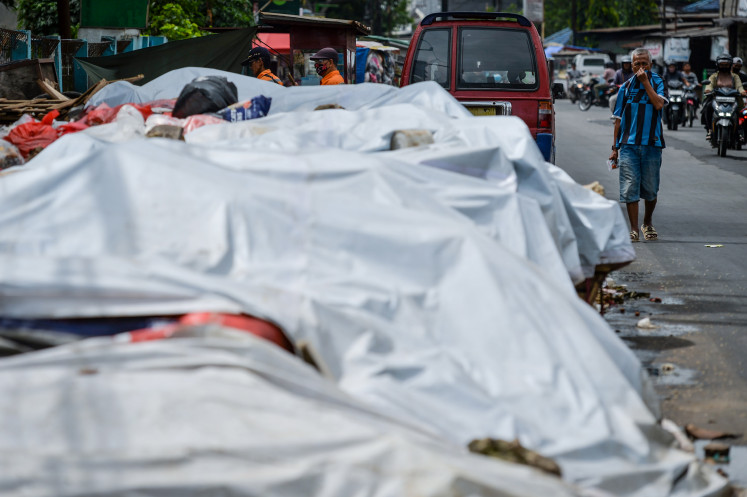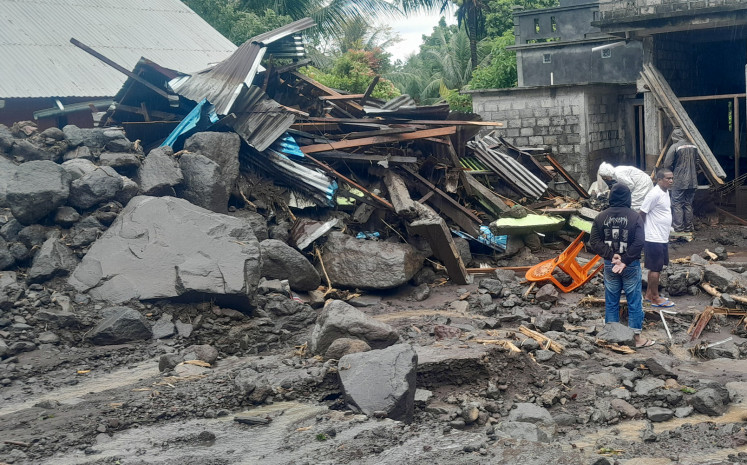Popular Reads
Top Results
Can't find what you're looking for?
View all search resultsPopular Reads
Top Results
Can't find what you're looking for?
View all search resultsLGBT people hope to gain sense of safety, belonging
Yes, the picture is not all rainbows and unicorns, as they say.
Change text size
Gift Premium Articles
to Anyone
D
espite rising religious conservatism in Indonesia, a trend often hijacked by politicians to gain popularity in the country, it turns out that lesbian, gay, bisexual and transgender (LGBT) communities still enjoy a semblance of safety and belonging.
Amid constant threats of violence, LGBT people still find some room where they can find a sense of belonging and self-actualization.
Maria (not her real name) is a 30-something transwoman who currently works as a wellness practitioner in the Canggu area of Bali.
She remains discreet about her identity, yet a number of people who work with her already know that she is a transwoman, and they still welcome her with open arms.
“Sometimes, some of my friends or colleagues out me as a transwoman to the clients of our wellness centers, our friends or our coworkers. Nonetheless, people still treat me with respect afterward,” Maria said, adding that she was quite lucky to be able to work in an environment that was quite tolerant.
Maria said she could occasionally still visit her family members living in North Sumatra.
It’s not all rainbows and unicorns. Lini Zurlia, advocacy officer at the Association of Southeast Asian Nations Sexual Orientation, Gender Identity and Expression Caucus (ASEAN SOGIE Caucus), said during a recent online seminar that the year 2020 presented a lowlight specifically for the Indonesian transwomen community.
Lini then mentioned several cases of violence: In Aceh and Papua, transwomen had been stabbed and attacked by several assailants, while a transwoman in Java had been beaten black and blue by strangers.
The most horrendous and tragic story is that of Mira, a transwoman accused of stealing who was burned to death by a gang of men on April 4 last year at a bus terminal in Cilincing, East Jakarta. The men were only charged with aggravated assault instead of murder.
Lini said not everyone was as lucky as Maria, saying that the most painful kind of rejection and discrimination faced by LGBT people did not come from the religious fundamentalists or hooligans on the streets, but from people’s own family members.
Separately, Dede Oetomo, the founder of GAYa Nusantara, Indonesia’s oldest LGBT advocacy group, admitted that families were “the last line of resistance against LGBT individuals”.
“Now, we have lots of [gay and transgender] children being disowned by their parents and we’re in over our heads trying to find shelter for these people. Families sometimes reject their homosexual children on the grounds that they are not ‘real men’,” he told The Jakarta Post over the phone.
“Things become especially difficult when these parents swallow the government’s social construction about LGBT individuals as ‘deviating from the norms’.”
The LGBT community, however, did not want to waste time feeling sorry for themselves, said Lini, adding that the tough situation they faced had pushed them to muster up all reserves of resilience, bravery and creativity.
“We believe we have to create a sense of safety for ourselves. Expecting that the state will fulfill its duties in providing us a sense of safety can be tricky [...] when in fact the state itself has actively sponsored [discrimination of LGBT individuals] by issuing regional bylaws or bills that seek to criminalize and pathologize LGBT individuals,” she said.
The controversial family resilience bill introduced earlier last year could be one example of such legal products. The bill cited the need for family members to report any “sexual misconduct”, including homosexuality.
“This is why the most powerful thing we can do as LGBT individuals in Indonesia is to build a collective, a community, to find a support system. Out of this collective, we work together to build a safety mechanism to protect ourselves. When we experience violence, what should we do? We must do these things alone and forget, even just for a while, that we are actually citizens of this country,” she said, with a tinge of both hope and despair.
Love is love: Activists from Lesbian, Gay, Bisexual and Transgender (LGBT) communities stage a rally calling for greater protection of their rights in Jakarta in this file photo taken before the pandemic. (Courtesy of Tribunnews/Irwan Rismawan)Indonesia’s LGBT-rights organizations, like Arus Pelangi and Suara Kita, to name but a few, have provided safe places for many of these “lost” LGBT individuals.
Lini said that, due to social stigma, self-acceptance was a long and winding journey for any LGBT individual. Yet, together with their fellow LGBT friends in these organizations, the journey can become much easier that walking the walk by yourself.
“For instance, we can learn about scientific explanations as to why things are so hard for LGBT individuals, to understand that it’s not totally our fault,” she explained.
Scholar and writer Julia Suryakusuma, meanwhile, said she understood very well LGBT individuals’ struggle with self-acceptance.
“A lot of my gay friends have actually poured their hearts out to me, and they think it’s kind of ridiculous to lay bare their souls to me that way, but I actually understand their struggle, since the personal is always political,” she told the Post over the phone.
“All of us have self-acceptance issues, whether because of our sexuality, our ethnicity [or anything else]. The struggle is how to stay true to oneself. Don’t be afraid; currently LGBT people have a lot of allies in Indonesia,” added Julia, who also identified herself as an LGBT ally.
Maria noted that social media, as well as a lot of LGBT celebrities, such as the gay Sam Smith or the transwoman Dutch makeup artist known by the name Nikkie Tutorials, could help Indonesia’s youngsters accept LGBT individuals as people who can contribute positively to society.
Dede explained that pre-colonial Indonesia had more fluid and relaxed attitudes about gender and sexuality.
For instance, he said the Bugis people in South Sulawesi recognize five forms of gender identity, while many reliefs in Indonesian temples depict homosexual relationships.
Yet, the wave of Wahabbi puritanism from Saudi Arabia, along with the cold “Wilhelmina morality” imbued by the Christian mores brought by Dutch and other European colonists to Indonesia then changed everything, Dede said.
Yet, he noted that, in a strange turn of historical waves, as Pope Francis stated that same-sex couples should be covered by civil unions, many Catholic-dominated regions in Indonesia had begun to embrace LGBT individuals.
A most notable example is Mayora Victoria, the first transwoman to ever serve as the chairwoman of the Village Consultation Agency in Maumere, West Nusa Tenggara. Mayora is also a member of Fajar Sikka, a transwomen community in Maumere.
And there’s more encouraging news: United States-based Pew Research Institute polled 38,426 respondents across 34 countries from May to October last year and found that 9 percent of Indonesians agreed that homosexuality should be accepted by society, an increase from only 3 percent in 2013.
Who knows what the future might hold for Indonesia’s LGBT community.
Maria may serve as inspiration in this case. “I truly love my job, helping other people promote their wellness, physically and mentally,” she said. (ste)

